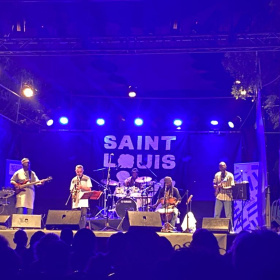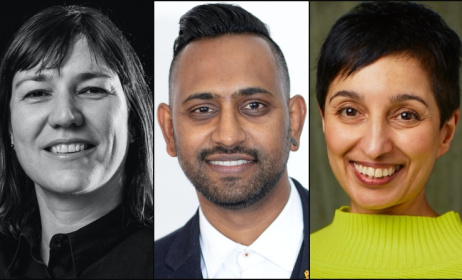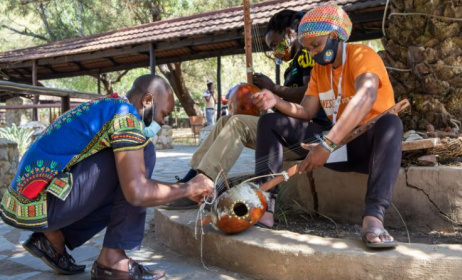How to earn a salary as a musician in South Africa
Society’s consistent consumption of music seems to stand in stark contrast to the unstable income terrains many music creators find themselves inhabiting. The trope of the starving musician is an all-too-familiar fixture in popular culture, and it is often used as a starting-point for discussions about how to earn an income outside of actually playing music.
However, what isn’t as widely discussed is how one can build a sustainable and rewarding career as a music creator, without having to step into peripheral roles like teacher, manager, booking agent, etc. Although these are all valid and viable ways to increase one’s revenue streams while still being involved within the sphere of music, most musicians, fundamentally, want to earn a living by playing their instruments.
This article reviews some of the ways to do so while maintaining a stable income.
Orchestras and ensembles
The current state of the classical music industry in South Africa seems at odds with the public’s perception of it. While generally imagined as a prestigious sector, where one is guaranteed prosperity and acclaim once they manage to manoeuvre their way through its elite chambers, sadly, this is no longer the case. This is due to a variety of factors, such as the withdrawal of public funds and the increasing scarcity of private sponsorship. These developments have been compounded by dwindling interest in the genre, as audiences are increasingly drawn to popular music.[1]
Yet, this shouldn’t dishearten the aspiring classical musician, as there remain established networks, both local and international, for those who sincerely wish to pursue this vocation.
The survival of orchestral music in post-apartheid South Africa has been greatly dependent on the undertaking of significant structural and social changes.[2] This has led the genre to become more inclusive, with concerted efforts to build community outreach programmes. These often take the form of non-profit educational organisations, such as the various youth orchestras and ensembles around the country. Many of these organisations, such as Buskaid, have international origins but focus exclusively on creating opportunities for South African musicians.[3]
It is mainly from these programmes such as these that musicians at a Grade 7 level, ranging from 13 to 25 years old, can audition to be part of the South African Youth Orchestra. These anonymous auditions take place in two stages: the first is a recorded audition and the second is a physical audition where the musician plays behind a screen. If accepted into the orchestra, the young musician takes part in various courses, workshops and tours that help them perfect their craft while forming networks at home and abroad.[4]
It is from the ranks of the South African Youth Orchestra that 71% of performers in the country’s three fully operational orchestras get their start as working musicians. These orchestras, the Cape Philharmonic Orchestra, the Johannesburg Philharmonic Orchestra and the KwaZulu-Natal Philharmonic Orchestra, each consist of 80 to 120 musicians.[5]
Although estimated earnings will vary depending on the orchestra or ensemble, the Economic Research Institute (ERI) conducted a compensation analysis based on survey data it gathered from various formally employed musicians within the industry. According to this study, the average South African musician’s earnings range between R267 418 and R463 500 annually,[6] though figures from Music In Africa’s Revenue Streams for Music Creators in South Africa 2022 report indicate that the average is closer to R13 000 per month.
Also note that some orchestras may offer additional permanent employment benefits like medical aid, life/disability insurance and retirement annuity, as well as instrument insurance and an allowance for reeds and strings.[7]
Video: The Buskaid Soweto String Ensemble performs the traditional wedding song ‘Amavolovolo’.
Session work
A session musician is defined by Berklee College of Music as “an expert studio player who is hired on a short-term basis to record backing tracks for recording artists.”[8] Historically, each studio would have an in-house ensemble it would use as backing artists for recordings. Some of the most renowned groups in history are Motown’s Funk Brothers, Los Angeles-based Wrecking Crew, and Stax Records’ Booker T & the M.G.'s, all of whom played on hundreds of Top 40 hits for artists ranging from Bob Dylan to The Temptations.
Lessons for South African session musicians from history
One of South Africa’s most infamous recording sessions took place between October 1985 and June 1986. After being handed a bootleg cassette of The Boyoyo Boys’ ‘Son Op’ by Heidi Berg, US musician Paul Simon was so taken by the sound that he traced the tape’s origins back to South Africa and the mbhaqanga musical style. He then arranged the controversial recording session, hiring Stimela’s Isaac Mthsi (drums) and Chikap ‘Ray‘ Phiri (guitar), who were joined by Tau Ea Matsekha’s Bakithi Kumalo (bass) and other notable Sowetan musicians to form the studio band behind the recording of the multi-platinum hit record, Graceland.[9]
The controversy started with Simon defying the UN General Assembly’s Cultural Boycott of Apartheid by travelling to work in South Africa, but extended to the large number of artists who, to this day, claim they weren’t adequately compensated nor properly credited on the album. Ray Phiri, prior to his passing in 2017, was quoted in The Sunday Times as saying, “There's bad blood with Paul Simon.” In the 2011 interview, Phiri claimed that “[Simon] never gave me credit on the album for the songs I wrote, and financially, we hardly got any royalties.”[10]
This controversy is just the most notable of countless examples of why it is important to get agreements in writing before commencing any work as a session musician. This ensures that all parties have a full understanding of what’s expected of them, including fees and payment structures, and any implications for musical rights and royalties that the studio musician’s involvement may have.
Video: The Boyoyo Boys’ ‘Son Op’ is said to have inspired the controversial Graceland recordings made by Paul Simon in the mid-1980s.
The current landscape
The development of digital music today has meant that the demand for instrumentalists isn’t what it used to be, and many session musicians, these days, are working as independent contractors. Online skills marketplaces, such as SoundBetter, have grown exponentially in recent years. This means that not only does one’s technical skill play a vital role in finding work but also one’s personality and professionalism, as the chances are that you will be working with new clients all the time.[11]
Ronan Skillen, a Cape Town-based percussionist, insists on the pivotal role that networking plays in getting consistent work. He says one must “make sure to always be punctual and respectful of everyone’s roles within the studio hierarchy” and points out that “some session players work so well with the artist, that they’re then hired to tour and play live with them.”[12]
Having worked as a professional musician for 17 years, Ronan has also taken notice of the importance of versatility in one’s own musical arsenal, as one has to be able to shift their style according to whatever type of music is being recorded.
Skillet recommends the following attributes for session artists:[13]
- Reliability.
- The ability to take direction.
- Being a team player.
- High technical skill in at least one instrument.
- The more instruments you are proficient in, the more opportunities there are to find work.
- An extensive knowledge of a broad spectrum of musical styles.The ability to read music and grasp ideas/pieces fast.
On average, a session musician can expect to earn R1 500 per three-hour recording session. According to Music In Africa’s 2022 report, this translates to average monthly income of R4 527 for session musicians in South Africa. However, it is important to note that this is all dependent on one’s experience and the artist/producer one is working with. As mentioned earlier, always ensure that some type of formal agreement, usually in the form of a written contract, is reached by all parties before recording commences.
Other earning opportunities for musicians
Although the two routes discussed above are arguably the most common ways for musicians to earn a fixed income today, there are other avenues that can also provide some form of income stability:
- Church bands and worship groups can provide a stable source of income, both in the form of weekly performances (during services) and studio settings – as more and more churches look to record and stream content online.
- Theatrical productions (particularly musicals) might require musicians, who are then usually contracted for both rehearsal and performance dates.
- Jazz ensembles can earn contracts in the hospitality industry, performing regularly at events such as restaurant/exhibition openings and weddings.
- Cruise ships offer live-in, travel-abroad work opportunities for musicians who are looking to perform regularly.
Final thoughts
Potential revenue streams do exist for musicians who are determined to learn a living through playing their instrument(s). Key success factors include building productive networks, being highly skilled in your instrument of choice, and learning to adapt your style to suit the needs of the opportunity you are presented with.
Resources and citations
- [1] Burdukova, P. (2010). An Analysis of the Status of Orchestras in South Africa. University of Pretoria. Accessed on January 5, 2022: https://repository.up.ac.za/bitstream/handle/2263/28254/dissertation.pdf?sequence=1
- [2] Ibid.
- [3] Buskaid. (2009). “What is Buskaid?” Accessed on January 5, 2022: https://www.buskaid.org.za/what.html
- [4] SAMRO. (2016). “Audition for the National Youth Orchestra”. Accessed on January 5, 2022: https://www.samro.org.za/news/articles/audition-national-youth-orchestra-2016
- [5] Cape Town Philharmonic Orchestra. (2021). Policies and Procedures. Accessed on January 5, 2022: https://www.cpo.org.za/new/wp-content/uploads/2021/02/cpo-policies-and-procedures-feb-21.pdf
- [6] Economic Research Institute. (2022). “Musician Salary in South Africa.” Accessed on January 5, 2022: https://www.erieri.com/salary/job/musician/south-africa
- [7] KwaZulu-Natal Philharmonic Orchestra. (2021). “Job Opportunities”. Accessed on January 5, 2022: http://artarena.co.za/kznpo/jobs.html
- [8] https://www.berklee.edu/careers/roles/session-instrumentalist
- [9] Runtagh, J. (2016). Paul Simon’s ‘Graceland’: 10 Things You Didn’t Know. Rolling Stone. Accessed on January 5, 2022: https://www.rollingstone.com/feature/paul-simons-graceland-10-things-you-didnt-know-105220/
- [10] Gottlieb, J. (2021). How Paul Simon Depended on Other Musicians to Make ‘Graceland’. Classic Rock & Culture. Accessed on January 5, 2022: https://ultimateclassicrock.com/paul-simon-graceland-other-musicians/
- [11] Post Matric. (2019). “Interview with Neil Potgieter”. Accessed on 5 January, 2022: https://www.postmatric.co.za/musician/
- [12] Original interview with Ronan Skillen for Music In Africa, 21 November 2021.
- [13] Ibid.
This article is part of the Revenue Streams for African Musicians project, supported by UNESCO’s International Fund for Cultural Diversity in the framework of the UNESCO 2005 Convention on the Protection and Promotion of the Diversity of Cultural Expressions, the Siemens Cents4Sense programme, Siemens Stiftung, Goethe-Institut, the National Arts Council of South Africa and Kaya FM.
Editing by David Cornwell and Kalin Pashaliev





























Commentaires
s'identifier or register to post comments